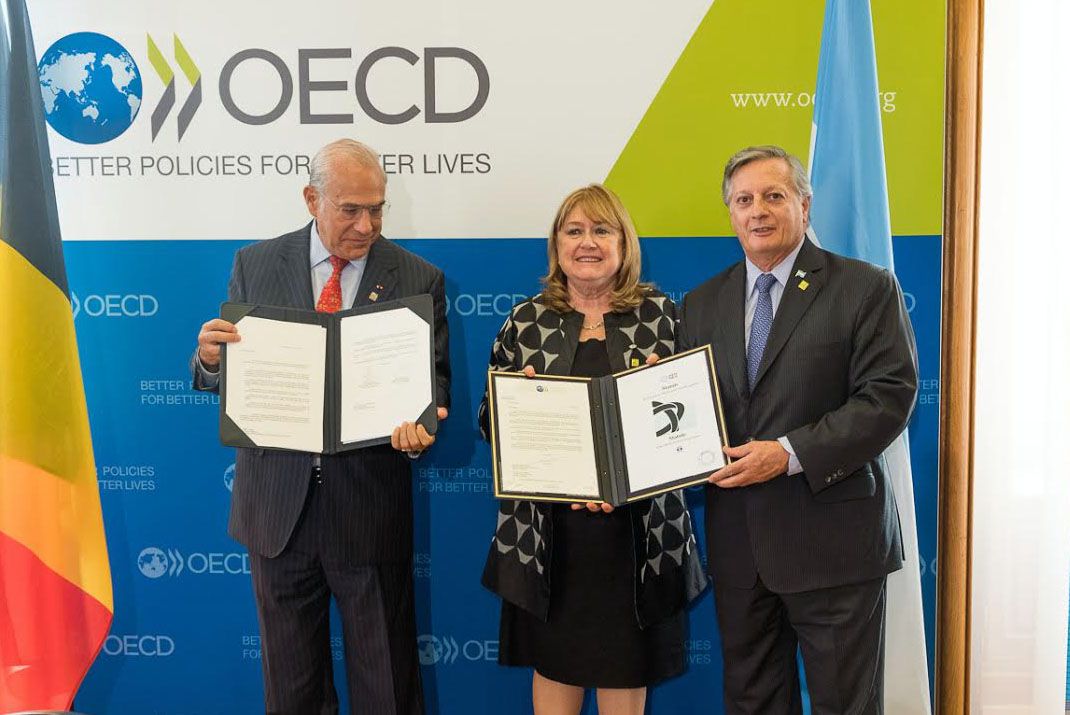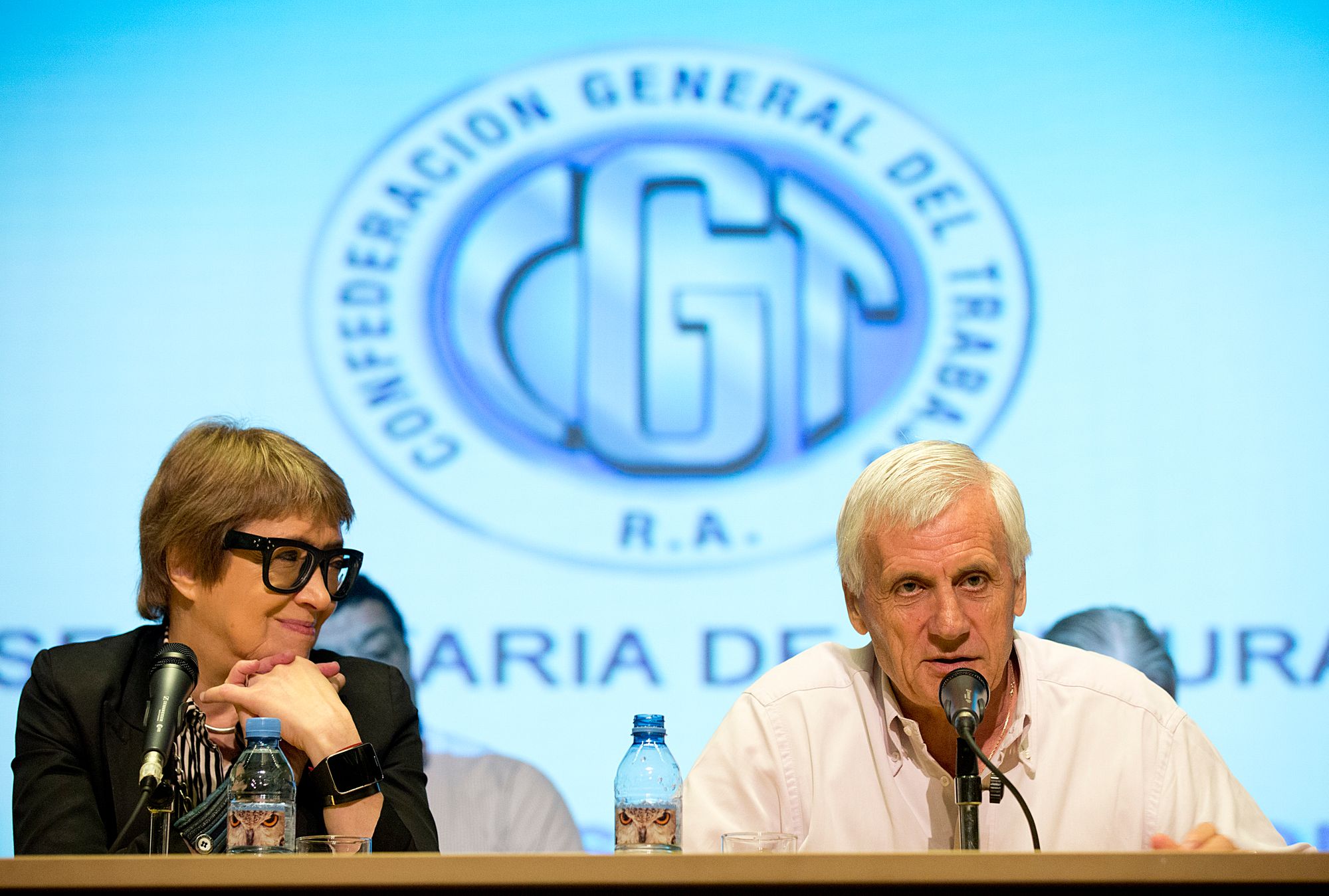Argentina’s name may mean “made of silver,” but oftentimes its economy does not seem as strong as the name might suggest. With yearly inflation reaching almost 60 percent and the country mired in debt, policymakers are grasping for a solution without much success. Meanwhile, many Argentines follow the US-peso exchange rate religiously, yet seem to have little control over its fluctuations. Foreign investors anxiously watching October’s general elections flee from the peso every time the leftist candidate surges in the polls, while the currency grows stronger when President Mauricio Macri’s government gains support.
At this point, Argentina’s economy is intertwined with non-state actors, beyond just foreign investors, and the quandary the country’s leadership faces is this: how to balance their competing, often diametrically opposed interests. On one hand, international financial institutions such as the World Bank, the International Monetary Fund, and the Organization for Economic Cooperation and Development exert a significant amount of free-market pressure over Argentina’s economic policy, yet Argentina’s powerful trade unions also put pressure on the government from below to enact more socialist policies. Balancing these two interests will certainly be a tricky challenge, yet whatever happens will ultimately depend on the election results. Above all, Argentina's economic status reminds the world that, despite the proliferation of non-state actors, state actors still maintain key levels in enacting policies over their countries.
Pressures from Above: International Financial Institutions
Politics complicates Argentina’s long and complicated financial history. The fall of a military government in the 1980s left Argentina with massive amounts of debt; subsequently, the government pegged the Argentine peso to the US dollar, which ended up reducing Argentine exports and plunging the country into a deep recession. In 2001, the country defaulted on its debts.
After the default, a commodity boom brought the Argentine economy back to its feet, but the administrations of Néstor and Cristina Fernandez de Kirchner engaged in some dubious economic management, printing money to pay for large budget deficits and instituting controls on American dollars leaving the country. Again, Argentina defaulted on its debts, forcing the International Monetary Fund to lend Argentina US$57 billion in order to save its faltering economy.
That bailout initiated major international involvement in Argentine economic policy. As part of the bailout, the IMF set numerous conditions on Argentina’s economic policy. Similar to the Spanish and Greek austerity packages in the Eurozone crisis, Argentina has raised taxes, reduced tax exemptions, scaled back capital expenditures, and frozen public hiring in order to transform its previous budget deficit into a surplus at the behest of the IMF. The organization also recently met with the two leading opposition candidates in October’s elections, discussing their economic plans behind closed doors (and likely trying to convince them to continue following the IMF’s policy recommendations).
Understandably, many in Argentina have not received these changes well, reminded of past times times when Spain made all of Argentina’s economic decisions. To many, the IMF is a bogeyman in Argentine circles. “The International Monetary Fund is the Eye of Sauron over Argentina,” an international commentator wrote in Forbes. Such comments underscore the influence such international organizations have on Argentina’s economy and economic performance, with perhaps more influence than the ordinary Argentine would want.
The World Bank represents a second international financial institution that has at least some influence on Argentina’s economy. However, its mission to grant no-interest loans to developing countries to help promote social progress and development is less controversial. The Bank recently approved a new loan to Argentina to improve public sector efficiency and Argentina’s response to climate change, something that both sides of the political divide have welcomed. It has also supported sustainable development and social welfare policies in the past, though loans that have helped make structural reforms to Argentina’s economy.

Finally, the Macri administration has moved for the country to join with a third international non-state actor, the Organization for Economic Cooperation and Development (OECD), widely considered a “club of rich countries” that work together to promote sound free-market economic policies. “The process is long, difficult, and complex,” Marcelo Scaglione, the undersecretary for OECD accession, said at an event at the Ministry of the Treasury. “It’s a process of finding out where we are and knowing both our strengths and our weaknesses.” Nonetheless, the Argentinian government under Macri remains committed to joining the organization, as part of his crusade to improve the country’s economy and clamp down on rampant inflation.
As such, the OECD’s review process, statistics gathering, and policy recommendations provide Argentina a solid foundation to improve its economy, at least from Western perspectives of what constitutes a strong free-market economy. First, the country passed a new competition law to break up existing cartels that dominated the industry, exert increased oversight over mergers and acquisitions, and strengthen its competition regulator. Second, Macri’s administration has introduced several new decrees streamlining regulations and reducing bureaucratic red tape. Third, Congress passed legislation increasing the central bank’s independence. All three key measures came in response to OECD recommendations and directives that will help to streamline the accession process.
Especially for a country such as Argentina, acceding to the OECD proves the cliché that life is more a journey than a destination. Once Argentina finally does achieve membership in the OECD, it stands to gain increases in foreign investment, and outside investor confidence is key to shore up the struggling peso. It will also gain reputational benefits, which will allow it to repay its debts at lower interest rates, a key plank in Argentina’s economic recovery. However, complete membership recognizes the idea that Argentina has adopted the OECD’s best practices and improved its economic institutions, steps that Argentina has already started taking as part of the accession process. Therefore, the influence that the OECD has upon Argentina’s economy during this process is paramount in achieving these benefits.
The interplay between state actors and supranational non-state actors also merits discussion, as joining the OECD requires a potential member to secure the consent of all 36 member states already in the organization. As such, normal interstate politics comes into play, and a nominally supranational organization is beholden to the interests of its individual member states in the case of accession. The inverse is also true: if Argentina decides it no longer wants to join the OECD, nothing legally requires it to continue making the changes necessary for accession (or, for that matter, reversing previously made changes). This becomes relevant in light of presidential elections in October pitting the pro-business incumbent Macri against Peronist Alberto Fernandez (and his running mate Cristina Fernandez de Kirchner, the country’s divisive former president).
The Fernandez-Fernandez ticket opposes Argentina’s membership in the OECD. “Are you going to ask a shoe manufacturer to pay the costs of joining the OECD just because Macri thought it was a good idea?” Fernandez told Mundo Empresarial. “Joining the OECD is absolutely worthless.” If Fernandez and Kirchner win office in October, they will likely stop the accession process. In all, the degree to which OECD influences Argentina as a state depends on how much the state wants the organization to influence it, and the same is true for the other states currently in the accession process.
Scaglione took pains to emphasize accession’s cross-party support, though, pointing out that several bills implementing the OECD’s requested changes passed in Argentina’s Chamber of Deputies with near-unanimous levels of support. He also noted that the moderate parties that split from the Kirchners while still opposing Macri generally had not staked out a position on the issue at the time of writing, which leaves open the opportunity for negotiations in case of a divided legislature after October’s election. Still, the extent to which the OECD as a non-state actor still depends on Argentinian domestic politics, especially how willing the country is to enact reforms.
Pressures from Below: Trade Unions
Another group of non-state actors will certainly impact that calculus: Argentina’s powerful unions, or sindicatos in Spanish. The sindicatos often advocate for policies directly and diametrically opposed to international financial institutions, and that divide sheds light on the interaction between domestic politics and broader questions of non-state actors.
In an interview for the Argentinian daily Clarín, World Bank official Jenko Hentschel noted that the country has not passed necessary reforms promoted by his organization because of “interest groups that defend their own interests.” Of course, the unions strongly oppose comprehensive labor reforms that Macri has proposed, fearing that they would further concentrate power in the hands of big business and away from workers. “They look at their piece of the pie and fight for their portion,” Hentschel continued.
Unions’ influence in Argentina vastly exceeds their comparable influence in the United States, and it appears that striking is a national pastime. Argentine pilots and air traffic controllers are among the highest paid in the world because they have the power to shut down the country’s air transportation system during their frequent strikes, and general strikes commonly shut down the country.

Oftentimes, unions act in direct contradiction to international financial institutions, as Hentschel noted before. A general strike on May 29, 2019 was framed in direct response to IMF policies, which union leaders said had directly resulted in increased poverty. International union leader Shane Burrow called on Macri’s government to “take action to support the real economy rather than limiting itself to following the mandates of the IMF and the financial markets,” for instance. An earlier strike exactly a month earlier, again to protest IMF-forced austerity measures, also paralyzed the country’s economy.
Unions do not have as much power as the international institutions to directly influence Argentina’s economy, seeing as general strikes are more reactive instruments than proactive ones, but they represent the powerful force of public opinion. By shutting down large swaths of the country’s economy, they can push for more worker-centric economic reforms and perhaps persuade legislators that their constituents do not support Macri’s reform. Centrist voters tired of strikes may vote for the Fernandez-Fernandez ticket come October, knowing that the unions will not strike against favorable policies. Even if they cannot bail Argentina out of its economic rut, they can still force major concessions at the negotiating table.
The State in Control
Above all, the influence of each of the non-state actors in Argentina’s economy rests on various state decisions. Previous state decisions by a socialist governments managed the economy quite poorly, which in turn caused Macri’s election. In turn, Macri turned to international financial institutions for help, another state decision that brought obligations imposed by non-state actors. As a result, the state’s actions still constrain non-state actors, even if non-state actors constrain the state: without previous state decisions, Argentina would not be at this point.
Of course, the state still has the power to withdraw from OECD accession, ignore World Bank mandates, or refuse to deal with the IMF. Many international mandates have few enforcement mechanisms, leaving ultimate power in the state’s hands. Indeed, Néstor Kirchner turned his back on international institutions such as the IMF and World Bank. Kirchner defaulted on Argentina’s debts rather than accepting the fund’s conditions, and the fund subsequently agreed to roll over Argentina’s debt. “It showed the world that a country could defy the IMF and live to tell about it, and contributed to the ensuing loss of IMF influence in Latin America,” the Guardian stated. Kirchner’s state decision, therefore, had a key impact on a non-state actor, both in Argentina and across the region.
Argentina’s complicated relationship with unions also rests upon earlier state decisions. When Juan Peron took over the country in 1943, he built upon strong relationships with union leaders in what Torcuato Di Tella calls “mobilizational caudillismo.” During Argentina’s right-wing military dictatorships, the unions lost much of their power due to government regulations and oftentimes violent suppression. Even after the dictatorship ended, the then newly-elected Alfonsín administration proposed the “Mucci bill,” which would have significantly limited union leaders’ power. Unions mobilized and re-exerted the power they had lost to defeat the bill, but the fall of the dictatorship created a more permissive political climate which enabled them to do so. Nonetheless, the state itself showed it had the power to define its relationship with the unions.

Unions’ political power fell again in the 1990s during a neoliberal political climate, but under the Kirchners, unions have thrived because both Néstor and Cristina have formed alliances with unions, passing legislation protecting unions’ right to strike. As such, unions’ role in politics has depended on the broader political climate, as well as state decisions: changes in the country’s government have also produced changes in unions’ status.
Despite this issue’s focus on the increasing role of non-state actors, Argentina makes the case that domestic politics and state decisions ultimately constrain or enable non-state actors, and the actions of non-state actors can ultimately be traced back to nation-states. In the end, the state has the final power to determine which set of non-state actors will influence its policy the most, and domestic politics as indicated by the October elections will determine which government will make those state decisions.
Ultimately, whoever wins those elections should not abandon institution-led reforms, but she or he also should not turn a blind eye to the unions either. A middle ground might achieve some success: labor reforms should give companies more latitude to hire and fire employees but should also expand the safety net and job training programs for the unemployed, for example. Such a compromise could appeal to both unions and international regulators looking for a more stable Argentine economy.
What the future holds, then, is uncertain, and much depends on the winner of the upcoming presidential election. Will the status quo continue, with the state aligning itself with international institutions? Or will Argentina’s next president change strategies and adopt union-backed reforms? Voters, and voters alone, will decide which non-state actor will influence state policy the most.




